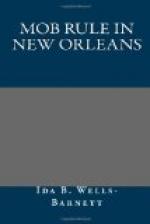The belongings of Robert Charles which were found in his room were a complete index to the character of the man. Although the room and its contents were in a state of chaos on account of the frenzied search for clews by officers and citizens, an examination of his personal effects revealed the mental state of the murderer and the rancor in his heart toward the Caucasian race. Never was the adage, “A little learning is a dangerous thing,” better exemplified than in the case of the negro who shot to death the two officers.
His room was searched, and the evidence upon which the charge that he was a desperado consisted of pamphlets in support of Negro emigration to Liberia. On his mantel-piece there was found a bullet mold and an outfit for reloading cartridges. There were also two pistol scabbards and a bottle of cocaine. The other evidences that Charles was a desperado the writer described as follows:
In his room were found negro periodicals and other “race” propaganda, most of which was in the interest of the negro’s emigration to Liberia. There were Police Gazettes strewn about his room and other papers of a similar character. Well-worn textbooks, bearing his name written in his own scrawling handwriting, and well-filled copybooks found in his trunk showed that he had burnt the midnight oil, and was desirous of improving himself intellectually in order that he might conquer the hated white race. Much of the literature found among his chattels was of a superlatively vituperative character, and attacked the white race in unstinted language and asserted the equal rights of the Negro.
Charles was evidently the local agent of the Voice of Missions, a “religious” paper, published at Atlanta, as great bundles of that sheet were found. It is edited by one Bishop Turner, and seems to be the official organ of all haters of the white race. Its editorials are anarchistic in the extreme, and urge upon the negro that the sooner he realizes that he is as good as the white man the better it will be for him. The following verses were clipped from the journal; they were marked “till forbidden,” and appeared in several successive numbers:
OUR SENTIMENTS
H.M.T.
My
country, ’tis of thee,
Dear
land of Africa,
Of
thee we sing.
Land
where our fathers died,
Land
of the Negro’s pride,
God’s
truth shall ring.
My
native country, thee,
Land
of the black and free,
Thy
name I love;
To
see thy rocks and rills,
Thy
woods and matchless hills,
Like
that above.
When
all thy slanderous ghouls,
In
the bosom of sheol,
Forgotten
lie,
Thy
monumental name shall live,
And
suns thy royal brow shall gild,
Upheaved
to heaven high,
O’ertopping
thrones.




